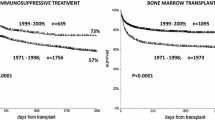Abstract
Between October 1981 and December 2000, 46 patients with Philadelphia chromosome-positive acute lymphoblastic leukemia (Ph+ ALL) underwent allogeneic hematopoietic stem cell transplantation (HSCT) in the Nagoya Blood and Marrow Transplantation Group. The median age was 28.5 years (range, 4–51 years). All but one patient achieved engraftment. Grade II-to-IV acute graft-versus-host disease (GVHD) developed in 32.5% of patients, and chronic GVHD developed in 40.5%. The incidences of relapse and treatment-related mortality (TRM) at 5 years were 65% and 26%, respectively. The estimated overall survival rate at 5 years was 23%. Univariate analysis showed that improved disease-free survival (DFS) was independently associated with complete remission (CR) at transplantation (39%), compared with non-CR (8%) (P =.023). Non-CR at transplantation was associated with a higher risk of relapse. Donor type, acute GVHD, and time from diagnosis to HSCT all had a significant effect on TRM. In a multivariate analysis, 9 months or more from diagnosis to HSCT was the only variable statistically significant for DFS (relative risk, 3.22; P =.01). This study demonstrates that allogeneic HSCT cures a significant population of patients with Ph+ ALL. Relapse is the major obstacle limiting the success of HSCT. Early transplantation during CR from donors, including unrelated persons or mismatched relatives, may offer improved long-term DFS.
Similar content being viewed by others
References
Faderl S, Garcia-Manero G,Thomas DA, Kantarjian HM. Philadelphia chromosome-positive acute lymphoblastic leukemia: current concepts and future perspectives.Rev Clin Exp Hematol. 2002;6:142–160.
Gökbuget N, Hoelzer D. Recent approaches in acute lymphoblastic leukemia in adults.Rev Clin Exp Hematol. 2002;6:114–141.
Dombret H, Gabert J, Boiron JM, et al. Outcome of treatment in adults with Philadelphia chromosome-positive acute lymphoblastic leukemia- results of prospective multicenter LALA-94 trial.Blood. 2002;100:2357–2366.
Takeuchi J, Kyo T, Naito K, et al. Induction therapy by frequent administration of doxorubicin with four other drugs, followed by intensive consolidation and maintenance therapy for adult acute lymphoblastic leukemia: the JALSG-ALL93 study.Leukemia. 2002;16:1259–1266.
Forman SJ, O'Donnell MR, Nademanee AP, et al. Bone marrow transplantation for patients with Philadelphia chromosome-positive acute lymphoblastic leukemia.Blood. 1987;70:587–588.
Wingard JR, Piantadosi S, Santos GW, et al. Allogeneic bone marrow transplantation for patients with high-risk acute lymphoblastic leukemia.J Clin Oncol. 1990;8:820–830.
Chao NJ, Forman SJ, Schmidt GM, et al. Allogeneic bone marrow transplantation for high-risk acute lymphoblastic leukemia during first complete remission.Blood. 1991;78:1923–1927.
Snyder DS, Nademanee AP, O'Donnell MR, et al. Long-term follow-up of 23 patients with Philadelphia chromosome-positive acute lymphoblastic leukemia treated with allogeneic bone marrow transplant in first complete remission.Leukemia. 1999;13:2053–2058.
Barrett AJ, Horowitz MM, Ash RC, et al. Bone marrow transplantation for Philadelphia chromosome-positive acute lymphoblastic leukemia.Blood. 1992;79:3067–3070.
Goldstone H, Prentice HG, Durrant J, et al. Allogeneic transplant (related or unrelated donor) is the preferred treatment for adult Philadelphia chromosome-positive (Ph+) acute lymphoblastic leukemia (ALL): results from the International ALL Trial (MRC UKALLXII/ECOG E2993) [abstract].Blood. 2001;98:856a.
Cornelissen JJ, Carston M, Kollman C, et al. Unrelated marrow transplantation for adult patients with poor-risk acute lymphoblastic leukemia: strong graft-versus-leukemia effect and risk factors determining outcome.Blood. 2001;97:1572–1577.
Yazaki M, Andoh M, Ito T, Ohno T, Wada Y. Successful prevention of hematological relapse for a patient with Philadelphia chromosome-positive acute lymphoblastic leukemia after allogeneic bone marrow transplantation by donor leukocyte infusion.Bone Marrow Transplant. 1997;19:393–394.
Matsue K, Tabayashi T, Yamada K, Takeuchi M. Eradication of residual bcr-abl-positive clones by inducing graft-versus-host disease after allogeneic stem cell transplantation in patients with Philadelphia chromosome-positive acute lymphoblastic leukemia.Bone Marrow Transplant. 2002;29:63–66.
Sierra J, Radich J, Hansen JA, et al. Marrow transplants from unrelated donors for treatment of Philadelphia chromosome-positive acute lymphoblastic leukemia.Blood. 1997;90:1410–1414.
Nyvold C, Madsen HO, Ryder LP, et al. Precise quantification of minimal residual disease at day 29 allows identification of children with acute lymphoblastic leukemia and an excellent outcome.Blood. 2002;99:1253–1258.
Mortuza FY,Papaioannou M, Moreira IM, et al. Minimal residual disease tests provide an independent predictor of clinical outcome in adult acute lymphoblastic leukemia.J Clin Oncol. 2002;20:1094–1104.
Ottmann OG, Druker BJ, Sawyers CL, et al. A phase 2 study of imatinib in patients with relapsed or refractory Philadelphia chromosome-positive acute lymphoid leukemias.Blood. 2002;100:1965–1971.
Author information
Authors and Affiliations
About this article
Cite this article
Iida, H., Sao, H., Kitaori, K. et al. Twenty Years’ Experience in Allogeneic Hematopoietic Stem Cell Transplantation for Philadelphia Chromosome—Positive Acute Lymphoblastic Leukemia in the Nagoya Blood and Marrow Transplantation Group. Int J Hematol 79, 79–84 (2004). https://doi.org/10.1007/BF02983538
Received:
Revised:
Accepted:
Published:
Issue Date:
DOI: https://doi.org/10.1007/BF02983538




